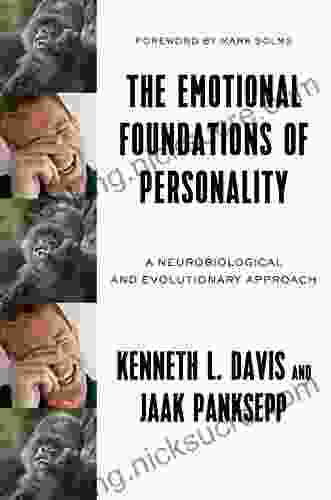The Emotional Foundations of Personality: Unraveling the Hidden Dimensions of Our Being

In the tapestry of human nature, emotions weave an intricate thread, shaping our actions, beliefs, and very essence. They are the invisible currents that guide our choices, ignite our passions, and determine our responses to the world around us. Understanding the emotional foundations of our personality is therefore paramount to gaining a comprehensive grasp of who we are and why we behave the way we do.
Emotions are not simply fleeting experiences but rather complex physiological responses that originate in the brain. The amygdala, a small almond-shaped structure nestled deep within the temporal lobes, plays a pivotal role in processing emotional information. It acts as a sensory hub, receiving and interpreting stimuli from both external sources and internal thoughts and memories.
When we encounter an emotionally evocative situation or thought, the amygdala rapidly evaluates its potential significance and triggers an appropriate response. This response can manifest in various ways, including physiological changes (e.g., increased heart rate),behavioral reactions (e.g., fight or flight),and subjective experiences (e.g., feelings of joy or fear).
4.4 out of 5
| Language | : | English |
| File size | : | 6767 KB |
| Text-to-Speech | : | Enabled |
| Screen Reader | : | Supported |
| Enhanced typesetting | : | Enabled |
| X-Ray | : | Enabled |
| Word Wise | : | Enabled |
| Print length | : | 342 pages |
While emotions can sometimes overwhelm us, they also hold immense potential for personal growth and fulfillment. Emotional intelligence, defined as the ability to recognize, understand, and manage our own emotions and those of others, is a crucial aspect of well-being and success.
Emotionally intelligent individuals are able to identify and label their emotions accurately, comprehend the triggers that evoke them, and regulate their emotional responses in a healthy and adaptive manner. They are also adept at empathizing with others, building strong relationships, and navigating social situations effectively.
Our personality traits, those enduring characteristics that distinguish us from others, are deeply intertwined with our emotional experiences. The "Big Five" model of personality, developed by psychologist Lewis Goldberg, outlines five broad traits that encapsulate the core aspects of our personalities:
Openness to Experience: Individuals high in openness tend to be imaginative, creative, and curious. They are eager to try new things, embrace diverse perspectives, and seek out experiences that stimulate their minds. Emotionally, they exhibit greater emotional sensitivity, aesthetic appreciation, and curiosity towards inner experiences.
Conscientiousness: Conscientious individuals are characterized by a strong sense of order, discipline, and responsibility. They are organized, reliable, and goal-oriented. Emotionally, they are often more controlled, restrained, and less prone to impulsive reactions.
Extroversion: Extroverts are energetic, sociable individuals who thrive in the company of others. They are assertive, outgoing, and enjoy engaging in social activities. Emotionally, they tend to be more expressive, gregarious, and prone to experiencing positive emotions.
Agreeableness: Agreeable individuals are cooperative, empathetic, and seek harmony in their relationships. They are trusting, forgiving, and eager to please others. Emotionally, they display greater compassion, empathy, and a desire to connect with others.
Neuroticism: Neuroticism refers to a tendency towards emotional instability, anxiety, and negative affectivity. Individuals high in neuroticism are more prone to experiencing negative emotions, such as anxiety, depression, and guilt. They tend to be more reactive to stress, dwell on negative thoughts, and avoid situations that evoke fear or discomfort.
The emotional foundations of our personality are largely shaped by our childhood experiences. The way we are nurtured, cared for, and parented have a profound impact on our developing sense of self and our capacity to regulate our emotions.
Secure attachments, characterized by consistent, responsive, and affectionate parenting, foster a sense of safety, worthiness, and emotional regulation. Children with secure attachments are more likely to develop healthy self-esteem, trust others, and cope effectively with challenges.
Conversely, insecure attachments, involving inconsistent or neglectful parenting, can lead to emotional dysregulation, insecurity, and difficulties in forming healthy relationships. Children with insecure attachments may develop avoidant, anxious, or disorganized attachment styles, which can persist into adulthood and have a negative impact on personality development.
Understanding the emotional foundations of personality is not merely an academic exercise but also a valuable tool for personal transformation. Various therapeutic interventions can help individuals gain insight into their emotional patterns, develop healthier coping mechanisms, and improve their overall well-being.
Cognitive Behavioral Therapy (CBT) explores the connections between thoughts, emotions, and behaviors. CBT helps individuals identify and challenge negative or irrational thoughts that contribute to emotional distress. By reframing these thoughts, individuals can learn to regulate their emotions and respond to situations in a more adaptive manner.
Dialectical Behavior Therapy (DBT) emphasizes the importance of mindfulness, emotional regulation, and distress tolerance. DBT teaches individuals skills to manage intense emotions, cope with difficult situations, and improve their interpersonal relationships.
Emotionally Focused Therapy (EFT) focuses on the emotional experiences and dynamics within relationships. EFT helps couples and individuals identify and express their emotions, develop secure attachments, and build healthier communication patterns.
The emotional foundations of our personality are a complex and multifaceted interplay of biological, psychological, and environmental factors. Understanding these foundations empowers us to embrace our emotions as a source of growth, resilience, and fulfillment. By fostering emotional intelligence, cultivating secure attachments, and seeking therapeutic support when needed, we can cultivate a deep and authentic connection to our inner selves and navigate the complexities of life with greater clarity, purpose, and joy.
4.4 out of 5
| Language | : | English |
| File size | : | 6767 KB |
| Text-to-Speech | : | Enabled |
| Screen Reader | : | Supported |
| Enhanced typesetting | : | Enabled |
| X-Ray | : | Enabled |
| Word Wise | : | Enabled |
| Print length | : | 342 pages |
Do you want to contribute by writing guest posts on this blog?
Please contact us and send us a resume of previous articles that you have written.
 Fiction
Fiction Non Fiction
Non Fiction Romance
Romance Mystery
Mystery Thriller
Thriller SciFi
SciFi Fantasy
Fantasy Horror
Horror Biography
Biography Selfhelp
Selfhelp Business
Business History
History Classics
Classics Poetry
Poetry Childrens
Childrens Young Adult
Young Adult Educational
Educational Cooking
Cooking Travel
Travel Lifestyle
Lifestyle Spirituality
Spirituality Health
Health Fitness
Fitness Technology
Technology Science
Science Arts
Arts Crafts
Crafts DIY
DIY Gardening
Gardening Petcare
Petcare James Dodson
James Dodson John Ramirez
John Ramirez Rashid Khalidi
Rashid Khalidi Denise Riebe
Denise Riebe Erica Hoke
Erica Hoke Jonathan Clements
Jonathan Clements Connie J Wells
Connie J Wells Jason Welker
Jason Welker Ralph Zuranski
Ralph Zuranski Katharine B Soper
Katharine B Soper Nikola Tesla
Nikola Tesla Peter Boardman
Peter Boardman Jeremy Freese
Jeremy Freese Cathal Armstrong
Cathal Armstrong Loren Pope
Loren Pope Kathleen Dean Moore
Kathleen Dean Moore Rick Heard
Rick Heard Victoria Schwab
Victoria Schwab Ronald J Harshbarger
Ronald J Harshbarger Matt Fulks
Matt Fulks Garcilaso De La Vega
Garcilaso De La Vega Florent Buisson
Florent Buisson Annette Curtis Klause
Annette Curtis Klause Robert B Yonaitis
Robert B Yonaitis Jeff Davis
Jeff Davis Jonathan Cummings
Jonathan Cummings Andrew Greiner
Andrew Greiner Zak Mt Standridge
Zak Mt Standridge Jim Shea
Jim Shea Kelly Oliver
Kelly Oliver Lisa Bond
Lisa Bond Victoria Ortiz
Victoria Ortiz Sorin Dumitrascu
Sorin Dumitrascu Susanna Kearsley
Susanna Kearsley Richard Heinberg
Richard Heinberg Luke Hohmann
Luke Hohmann Malinda Lo
Malinda Lo Kailin Gow
Kailin Gow Jennifer L Armentrout
Jennifer L Armentrout Steve Anthony Tallon
Steve Anthony Tallon Roger Atwood
Roger Atwood Daniel Shiffman
Daniel Shiffman Chris Mcmullen
Chris Mcmullen Donna Bollinger
Donna Bollinger Jenn Brandt
Jenn Brandt Terry Ann Williams Richard
Terry Ann Williams Richard Paco Underhill
Paco Underhill Rob Summers
Rob Summers Stan Tekiela
Stan Tekiela Anne Holler
Anne Holler Catie Czora
Catie Czora Laurie Ann Thompson
Laurie Ann Thompson Bhavesh Mamtani
Bhavesh Mamtani Brian C Muraresku
Brian C Muraresku James A Middleton
James A Middleton Jamie Ivey
Jamie Ivey Andre Watson
Andre Watson Andrew Gelman
Andrew Gelman Andrea Flores
Andrea Flores Charles H Hapgood
Charles H Hapgood Galit Shmueli
Galit Shmueli Shaun Assael
Shaun Assael Ken Gullette
Ken Gullette Lynne L Finch
Lynne L Finch Usa Pickleball Association
Usa Pickleball Association Cliff Wilson
Cliff Wilson Robert Sky Allen Ph D
Robert Sky Allen Ph D H Spencer Lewis
H Spencer Lewis Gaurav Suri
Gaurav Suri Paul Kalas
Paul Kalas Lena Shev
Lena Shev Sarah Castille
Sarah Castille Ricky Moore
Ricky Moore Gabby Rivera
Gabby Rivera Lucia Ashta
Lucia Ashta Kevin Cook
Kevin Cook Robert H Miller
Robert H Miller Jay Annelli
Jay Annelli Andrea Bemis
Andrea Bemis Big Daddy Ozone
Big Daddy Ozone Tod Schimelpfenig
Tod Schimelpfenig Bonita Norris
Bonita Norris Stacey Little
Stacey Little Clayton Everline
Clayton Everline Jim Curran
Jim Curran 18th Edition Kindle Edition
18th Edition Kindle Edition Jefferson Hawkins
Jefferson Hawkins Greg Presto
Greg Presto D Harvey
D Harvey Ben Doughty
Ben Doughty Nancy Mcwilliams
Nancy Mcwilliams Paulette F C Steeves
Paulette F C Steeves Ruby Walker
Ruby Walker Lori Shandle Fox
Lori Shandle Fox George E P Box
George E P Box Steven J Matthiesen
Steven J Matthiesen Steve Bisheff
Steve Bisheff James Turnbull
James Turnbull Andrea Cataldo
Andrea Cataldo Bill O Neill
Bill O Neill Julie Miller
Julie Miller Luke Rosiak
Luke Rosiak Andrew Duncan
Andrew Duncan David Scott
David Scott A J Carlisle
A J Carlisle Peter May
Peter May Milo Stewart
Milo Stewart Tom Lodziak
Tom Lodziak Stuart L Kaplan M D
Stuart L Kaplan M D Kjartan Poskitt
Kjartan Poskitt Ryan Pellett
Ryan Pellett Carrie Ryan
Carrie Ryan Stephen Chbosky
Stephen Chbosky Benedict Carey
Benedict Carey Bruce Mcnall
Bruce Mcnall Sheila Jasanoff
Sheila Jasanoff Caren Van Slyke
Caren Van Slyke Joe Wells
Joe Wells Stephan J Guyenet
Stephan J Guyenet Richard Bolstad
Richard Bolstad Course Hero
Course Hero Gwendolyn Griffith Lieuallen
Gwendolyn Griffith Lieuallen Robert Hamill
Robert Hamill Mara Vorhees
Mara Vorhees Bridget Portmann
Bridget Portmann Kelly Tyler Lewis
Kelly Tyler Lewis Andrew Beyer
Andrew Beyer Chiara Marletto
Chiara Marletto Trish Allison
Trish Allison Joseph Terry
Joseph Terry Brian Azzarello
Brian Azzarello Vin T Sparano
Vin T Sparano Jon Gillespie Brown
Jon Gillespie Brown Rick Westhead
Rick Westhead Eric Engle
Eric Engle Necoco
Necoco Ben Orlin
Ben Orlin Nick Peters
Nick Peters Morihei Ueshiba
Morihei Ueshiba Elizabeth S Meckes
Elizabeth S Meckes Mason Deaver
Mason Deaver Gerald A Moore Sr
Gerald A Moore Sr Harriet Brown
Harriet Brown Dylan Norton
Dylan Norton Mark Hume
Mark Hume Christina Kim
Christina Kim Hampton Sides
Hampton Sides Karen Robson
Karen Robson Bisco Hatori
Bisco Hatori Prasad Raju V V N R Pathapati
Prasad Raju V V N R Pathapati Oliver Perkins
Oliver Perkins Hayley Campbell
Hayley Campbell John Bantin
John Bantin George Hospodar
George Hospodar Mark Mcconville
Mark Mcconville Joseph Ledoux
Joseph Ledoux Robin Ha
Robin Ha Mandy Baggot
Mandy Baggot Leslie Vedder
Leslie Vedder Anne Marie Meyer
Anne Marie Meyer Jack Hunnicutt
Jack Hunnicutt Christian Keur
Christian Keur Joseph Luzzi
Joseph Luzzi Anna Holmwood
Anna Holmwood Andrea Cremer
Andrea Cremer Minal Hajratwala
Minal Hajratwala Ola Ola
Ola Ola Marissa Meyer
Marissa Meyer Joelle Charbonneau
Joelle Charbonneau Deaver Brown
Deaver Brown Peter David
Peter David Geoffrey Wolff
Geoffrey Wolff Kathryne Kennedy
Kathryne Kennedy Hugh Raffles
Hugh Raffles Francesca Zappia
Francesca Zappia Mike Cyra
Mike Cyra Thomas Watson
Thomas Watson Gillian Tett
Gillian Tett Sid Thatte
Sid Thatte Elizabeth S Trafalgar
Elizabeth S Trafalgar Mira Kirshenbaum
Mira Kirshenbaum Dorothy Pang
Dorothy Pang George Mahood
George Mahood Jakub Marian
Jakub Marian Tillie Walden
Tillie Walden Robert Bacal
Robert Bacal Future Publishing
Future Publishing Bruce Bowlen
Bruce Bowlen David W Brown
David W Brown Pete Pfitzinger
Pete Pfitzinger Tamara Ireland Stone
Tamara Ireland Stone Thomas Meyer
Thomas Meyer Lars Muhl
Lars Muhl Bernard Craw
Bernard Craw Catherine Montgomery
Catherine Montgomery Nancy B Rapoport
Nancy B Rapoport Leslie Sokol
Leslie Sokol Claire Maxted
Claire Maxted Steve Sheinkin
Steve Sheinkin Christine Balaz
Christine Balaz Steve Caplin
Steve Caplin William Ritter
William Ritter Jimmy Elliott
Jimmy Elliott Steven Poses
Steven Poses Andrew Brown
Andrew Brown Robin Satty
Robin Satty Frances Evesham
Frances Evesham Eugene Raikhel
Eugene Raikhel Robin Hobb
Robin Hobb Rich Luhr
Rich Luhr Shane Ryan
Shane Ryan Mary Keith Piasecki
Mary Keith Piasecki Frans De Waal
Frans De Waal Michele Leathers
Michele Leathers Jenna Miscavige Hill
Jenna Miscavige Hill Mark M Meerschaert
Mark M Meerschaert Leisy J Abrego
Leisy J Abrego Rachel Atwood
Rachel Atwood V E Schwab
V E Schwab Sue Fierston
Sue Fierston Ken Blanchard
Ken Blanchard Emily Henry
Emily Henry Roland Martin
Roland Martin Ian Tattersall
Ian Tattersall Ivan Pastine
Ivan Pastine Steven H Weintraub
Steven H Weintraub Andrew Feinberg
Andrew Feinberg Laurie Seale
Laurie Seale Tom Siegfried
Tom Siegfried Ann Gadzikowski
Ann Gadzikowski S Fatou
S Fatou Tom Lecompte
Tom Lecompte Arlo Adams
Arlo Adams Linda Eyre
Linda Eyre Jed Z Buchwald
Jed Z Buchwald Meiso
Meiso Carmen Micsa
Carmen Micsa Chris Lilly
Chris Lilly Matt Richtel
Matt Richtel Martin Rooney
Martin Rooney Stephanie Cacioppo
Stephanie Cacioppo Gregory Curtis
Gregory Curtis Will Thornton
Will Thornton James Fox
James Fox Brenda Reed Pilcher
Brenda Reed Pilcher Leslie Morgan Steiner
Leslie Morgan Steiner Marta Szabo
Marta Szabo Sameera Khan Rd Pa C
Sameera Khan Rd Pa C Becky Lomax
Becky Lomax Rachael Chapman
Rachael Chapman Jaak Panksepp
Jaak Panksepp Raymond E Feist
Raymond E Feist Vertamae Smart Grosvenor
Vertamae Smart Grosvenor Jay Greeson
Jay Greeson Laura Domino
Laura Domino Mike Gauthier
Mike Gauthier Nick Marshall
Nick Marshall Mara Rockliff
Mara Rockliff Daniel Humm
Daniel Humm Jason Zemcik
Jason Zemcik Wildlife Trusts
Wildlife Trusts Robert Jay Lifton
Robert Jay Lifton Michael Hermann
Michael Hermann Lilith Starr
Lilith Starr James Mallory
James Mallory Julie Powers
Julie Powers Jordan Romero
Jordan Romero Michael S Malone
Michael S Malone Erich Neumann
Erich Neumann Joseph Bruchac
Joseph Bruchac Samantha Rodman
Samantha Rodman Steve Scott
Steve Scott Richard P Feynman
Richard P Feynman Peter Mcbride
Peter Mcbride Sunny Anderson
Sunny Anderson Bruce D Perry
Bruce D Perry Antonio Iturbe
Antonio Iturbe Andrea Curtis
Andrea Curtis Ian O Connor
Ian O Connor Patrick W Galbraith
Patrick W Galbraith Michio Kaku
Michio Kaku Chris Salisbury
Chris Salisbury Walter Greiner
Walter Greiner William Gerin
William Gerin Linda Anne Silvestri
Linda Anne Silvestri Rupert Sheldrake
Rupert Sheldrake Lonely Planet
Lonely Planet Timothy Johnson
Timothy Johnson Ronald W Doerfler
Ronald W Doerfler Elizabeth Clor
Elizabeth Clor Wolfgang Hohlbein
Wolfgang Hohlbein Rashers Tierney
Rashers Tierney Steven M Fiser
Steven M Fiser Robyn Sheldon
Robyn Sheldon Dayton O Hyde
Dayton O Hyde Nancy Mather
Nancy Mather J E Lendon
J E Lendon James R Morrow Jr
James R Morrow Jr Barbara Merry
Barbara Merry Whitney Nelson
Whitney Nelson Hasok Chang
Hasok Chang Richard Maury
Richard Maury Richard Bellman
Richard Bellman Serena Valentino
Serena Valentino Bobby Orr
Bobby Orr Patsy M Lightbown
Patsy M Lightbown Michael Judge
Michael Judge Paul Abell
Paul Abell Melissa Caughey
Melissa Caughey Steven Johnson
Steven Johnson Metin Bektas
Metin Bektas Sandra Glosser
Sandra Glosser Kylie Lee Baker
Kylie Lee Baker Sudhir Shirwadkar
Sudhir Shirwadkar L Michele Issel
L Michele Issel Andrew Doughty
Andrew Doughty Marta Obiols Llistar
Marta Obiols Llistar Andrea Wachter
Andrea Wachter John Gilbert
John Gilbert Patrick Hatt
Patrick Hatt Sandy Stott
Sandy Stott Melissa Reynolds
Melissa Reynolds Jenny Mackay
Jenny Mackay Arianna Astuni
Arianna Astuni Joe Posnanski
Joe Posnanski Adam Mansbach
Adam Mansbach Josh Tabor
Josh Tabor Daniel P Murphy
Daniel P Murphy Bob Mayer
Bob Mayer Kiersten White
Kiersten White Ronald D Davis
Ronald D Davis Jennifer Blair
Jennifer Blair Roberto Pedreira
Roberto Pedreira Andrew Goliszek
Andrew Goliszek Tracy Townsend
Tracy Townsend Leigh Bardugo
Leigh Bardugo Jim Apfelbaum
Jim Apfelbaum J David Logan
J David Logan Laura Lincoln Maitland
Laura Lincoln Maitland Victoria Allman
Victoria Allman Greg Ruth
Greg Ruth Anne Bogel
Anne Bogel Richard N Aufmann
Richard N Aufmann James Branch Cabell
James Branch Cabell Dani Jacobs
Dani Jacobs Guillermo Ferrara
Guillermo Ferrara Margaret Thorsborne
Margaret Thorsborne John Morton
John Morton Rita Jablonski
Rita Jablonski Thomas Berger
Thomas Berger Sarah Outen
Sarah Outen Andrej Spec
Andrej Spec William F Sensakovic
William F Sensakovic Department Of Defense
Department Of Defense Kelsie Stelting
Kelsie Stelting Craig Custance
Craig Custance Elizabeth Marshall Thomas
Elizabeth Marshall Thomas James E Wisher
James E Wisher Michael Anderle
Michael Anderle Terence Callery
Terence Callery Kristin Briney
Kristin Briney Kirby Arnold
Kirby Arnold C B Lee
C B Lee Noel Janis Norton
Noel Janis Norton M D Johnson
M D Johnson James Lyons Weiler
James Lyons Weiler Christopher Sommer
Christopher Sommer Ed Willes
Ed Willes W J Hendry
W J Hendry Namina Forna
Namina Forna Pietro Matracchi
Pietro Matracchi Joe Cavallaro
Joe Cavallaro E K Johnston
E K Johnston Raymond Coppinger
Raymond Coppinger Brad Schoenfeld
Brad Schoenfeld Aldous Huxley
Aldous Huxley Gemma Rogers
Gemma Rogers Laird Hamilton
Laird Hamilton Charlotte Elkins
Charlotte Elkins Lauren Daniels
Lauren Daniels Richard Munson
Richard Munson Rachel Hawkins
Rachel Hawkins Arous Brocken
Arous Brocken Tim Wharnsby
Tim Wharnsby Peter Scazzero
Peter Scazzero Gabrielle Coleman
Gabrielle Coleman Kerri Andrews
Kerri Andrews Ewen Levick
Ewen Levick Jessica Mccrory Calarco
Jessica Mccrory Calarco Wendy Heard
Wendy Heard Doug Swisher
Doug Swisher Candace Clark Trinchieri
Candace Clark Trinchieri Janet Wolanin Alexander
Janet Wolanin Alexander Giada De Laurentiis
Giada De Laurentiis Sean Pidgeon
Sean Pidgeon Nathaniel Philbrick
Nathaniel Philbrick Jack Purdum
Jack Purdum Rajani Katta
Rajani Katta Patrick Mouratoglou
Patrick Mouratoglou Simon Garfield
Simon Garfield Susan Williams White
Susan Williams White Andrea Olson
Andrea Olson Andrea Komlosy
Andrea Komlosy James Rebanks
James Rebanks Keith Sutton
Keith Sutton Bettina Bonifatti
Bettina Bonifatti Suzy Ashworth
Suzy Ashworth Andrea Gonzales
Andrea Gonzales Galen Wolf
Galen Wolf Marvin L Bittinger
Marvin L Bittinger George Christian Pappas
George Christian Pappas Mike Davenport
Mike Davenport Paul Rooyackers
Paul Rooyackers Rolf Potts
Rolf Potts Kyle Keegan
Kyle Keegan Andrew St Pierre White
Andrew St Pierre White Christos Lynteris
Christos Lynteris 24th Edition Kindle Edition
24th Edition Kindle Edition Isabel Sterling
Isabel Sterling Paul Stamets
Paul Stamets Thomas S Kuhn
Thomas S Kuhn Rob Taylor
Rob Taylor Tim Ryan
Tim Ryan Stephen Wiggins
Stephen Wiggins Neil Oliver
Neil Oliver Romney Steele
Romney Steele Dr Gabriel Peter Salgo
Dr Gabriel Peter Salgo Tony Herman
Tony Herman Lundy Bancroft
Lundy Bancroft Dana Mccullough
Dana Mccullough Maria Konnikova
Maria Konnikova Marcus Felson
Marcus Felson Robin Mamlet
Robin Mamlet Brock Eide
Brock Eide Buster Benson
Buster Benson Andy Bull
Andy Bull Rizwan Virk
Rizwan Virk Pat Wray
Pat Wray Karen Tranberg Hansen
Karen Tranberg Hansen C L Werner
C L Werner Bernard Moitessier
Bernard Moitessier Kindra Gordon
Kindra Gordon Seth Reichelson
Seth Reichelson Riley Black
Riley Black Dot Edu
Dot Edu James Willstrop
James Willstrop David Alloway
David Alloway Bernard A Chavis
Bernard A Chavis Mary Jane Sterling
Mary Jane Sterling Christine Heppermann
Christine Heppermann Rachel Meltzer Warren
Rachel Meltzer Warren Marcus A Pfeiffer
Marcus A Pfeiffer David Montgomery
David Montgomery Pliny The Elder
Pliny The Elder Steven Arms
Steven Arms Jennifer Anne Davis
Jennifer Anne Davis Baz Thompson
Baz Thompson Sara Manning Peskin
Sara Manning Peskin James Geary
James Geary Luigi Gabriele Conti
Luigi Gabriele Conti Donald S Murray
Donald S Murray Gary Thomas
Gary Thomas Brandon Mull
Brandon Mull Charles Szypszak
Charles Szypszak Kristen Thone
Kristen Thone Kenneth S Shultz
Kenneth S Shultz David Abram
David Abram Andrea Hudy
Andrea Hudy April Vahle Hamel
April Vahle Hamel Jacqueline Edmondson
Jacqueline Edmondson C L Mississippi Morgan
C L Mississippi Morgan Jason Louv
Jason Louv David Borgenicht
David Borgenicht Jen Calonita
Jen Calonita Kristine Papin Morris
Kristine Papin Morris Andrew Blauner
Andrew Blauner Michael T Nygard
Michael T Nygard Joey Miller Msw Lcsw
Joey Miller Msw Lcsw Nic Oatridge
Nic Oatridge
Light bulbAdvertise smarter! Our strategic ad space ensures maximum exposure. Reserve your spot today!

 Travis FosterHow the Cleveland Indians of the 90s Went from Cellar Dwellers to Playoff...
Travis FosterHow the Cleveland Indians of the 90s Went from Cellar Dwellers to Playoff... Steve CarterFollow ·19.1k
Steve CarterFollow ·19.1k Matt ReedFollow ·5k
Matt ReedFollow ·5k Damon HayesFollow ·9.8k
Damon HayesFollow ·9.8k Milan KunderaFollow ·17.8k
Milan KunderaFollow ·17.8k Jamison CoxFollow ·6.6k
Jamison CoxFollow ·6.6k Harold PowellFollow ·6k
Harold PowellFollow ·6k Isaiah PriceFollow ·17.8k
Isaiah PriceFollow ·17.8k Caleb LongFollow ·5.3k
Caleb LongFollow ·5.3k

 Demetrius Carter
Demetrius CarterGolf Scrimmages: Realistic Practice Games Under Pressure
Golf scrimmages are...

 Andres Carter
Andres CarterAhsoka Tano: The Force-Wielding Togruta Who Shaped the...
Ahsoka Tano is one of the most...

 Greg Foster
Greg FosterUndeath Ascendant: A Blood-Soaked Literary Odyssey into...
Immerse yourself in a macabre tapestry of...

 Paulo Coelho
Paulo CoelhoHow an English Polymath and French Polyglot Discovered...
The Rosetta Stone is...
4.4 out of 5
| Language | : | English |
| File size | : | 6767 KB |
| Text-to-Speech | : | Enabled |
| Screen Reader | : | Supported |
| Enhanced typesetting | : | Enabled |
| X-Ray | : | Enabled |
| Word Wise | : | Enabled |
| Print length | : | 342 pages |














